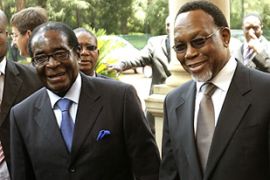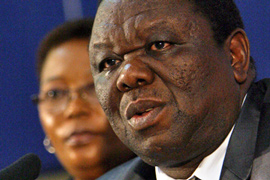‘Breakthrough’ in Zimbabwe talks
Opposition leader to become prime minister by February 11, regional bloc SADC declares.

MDC ‘reservations’
The SADC also agreed that control of Zimbabwe’s home affairs ministry should be divided between the ruling Zanu-PF and the MDC, or Movement for Democratic Change, for six months.
|
“Quite clearly, the conclusions reached as reflected in the communique fall far short of our expectations” MDC party statement issued after the SADC summit |
“All the parties expressed confidence in the process and committed to implementing the agreement,” Kgalema Motlanthe, South Africa’s president and the current SADC chair, said.
But the MDC said on Tuesday that the summit resolutions “fell far short” of what the party is looking for, and that it has not reached a decision on whether to accept the SADC’s position.
“Quite clearly, the conclusions reached as reflected in the communique fall far short of our expectations,” the party said in a statement.
“It is important that finality be brought to this issue and therefore our national council will meet this weekend to define the party position.”
Haru Mutasa, reporting for Al Jazeera from Harare, said: “The MDC has argued for a couple of months now, now that they want control of ministries that actually mean something, not small ministries where they can’t actually make much effect.”
Disputes between Zanu-PF and the MDC over the home affairs portfolio are due to that ministry being in control of the country’s police force.
Power sharing
An SADC communique released on Tuesday said that a constitutional amendment would be passed to create the prime ministerial post on February 5, with Tsvangirai’s appointment finalised six days later.
 |
| Tsvangirai has said a lasting deal cannot be reached unless MDC activists are freed [AFP] |
The latest development came a day after delegates said no progress had been made on resolving disputes between Mugabe and Tsvangirai over the allocation of cabinet posts.
Both men signed a power-sharing deal brokered by Thabo Mbeki, the former South African president, in September but have since failed to reach a consensus on how to share Zimbabwe’s key ministries.
The deadlock has stalled the formation of a unity government which would see Mugabe remain as president and his rival become the prime minister.
Bright Matonga, Zimbabwe’s deputy information minister, told Al Jazeera that “time is running out for the MDC. It is time they make a very clear decision and it is time that Tsvangirai shows leadership, if he is actually the man in charge of the MDC.
“How will they [MDC] reform the police force if they are not in the government? That is why it is important that they come on board.”
EU pressure
The power vacuum in Zimbabwe is compounded by a severe economic crisis that has seen runaway inflation as well as a serious cholera outbreak that the UN says has killed nearly 3,000 people.
Matonga said that the Zimbabwean government is doing its utmost to protect the health of the population, and angrily dismissed the UN figures.
“Disputing or not disputing a figure – it can be 100,000, it could be any number. But what is important is: are we doing anything to combat the cholera? Yes we are,” he said.
“If you try and play around with figurers like 3,000 or 4,000 … for us, one dead person is one too many. We cannot afford to lose our people because of cholera.”
In another development, the European Union on Monday tightened sanctions on Harare by adding more than 60 pro-Mugabe officials and companies to a visa and assets freeze that bans them from travelling to or trading with EU nations.
The blacklist, which now totals 203 people and 40 entities, is aimed at increasing pressure on Mugabe to stand down.
EU officials said most if not all of the 40 entities on the blacklist were fake companies used to funnel money to prop up Mugabe’s government and supporters.